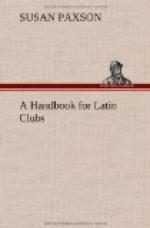A NEW VERSION OF THE DEATH OF CAESAR.
Harper’s Magazine. Vol.
cxv, p. 655.
POEM.—The Lads of Liege.
The Present Hour. Percy Mackaye.
P. 35.
New York Times. Sept. 2, 1914.
CICERO
“Caesar alone excepted, no ancient
Roman has been so widely, so
continuously, and so intensely alive since
his death, as has been
Marcus Tullius Cicero.”
—Wilkinson
THE HOUSE WHERE CICERO WAS BORN.
Roman Life in the Days of Cicero.
Alfred J. Church. Chap. vi.
HIS FAVORITE HOUSE.
Roman Life in the Days of Cicero.
Alfred J. Church. P. 121.
CICERO, THE MAN.
Cicero. John Lord. Chautauqua.
Vol. ii, p. 563.
Foreign Classics in English.
William Cleaver Wilkinson. Vol. iv.
Chap. vii.
CICERO, THE ORATOR.
Cicero in the Senate. Harriet
Waters Preston. Atlantic
Monthly. Vol. lxi,
p. 641.
CICERO, THE WIT.
Cicero as a Wit. W.L. Collins.
Chautauqua. Vol. xi, P. 377.
Cicero as a Wit. Francis W. Kelsey.
Classical Journal. Vol. iii,
p. 3.
Roman Life in the Days of Cicero.
Alfred J. Church. P. 197.
Foreign Classics in English.
William Cleaver Wilkinson, Vol. iv,
p. 235.
Humor Repeats Itself. Irene Nye.
Classical Journal. Vol. ix,
p. 154.
CICERO, THE EXILE.
Rome: The Eternal City.
Clara Erskine Clement. Vol. ii, p. 621.
Roman Life in the Days of Cicero.
Alfred J. Church. Chap. x.
THE PROSECUTION OF ARCHIAS.
Richard Wellington Husband. Classical
Weekly. Vol. ix, p. 165.
A COMPARISON: CICERO AND DEMOSTHENES.
Illustrated History of Ancient Literature.
John D. Quackenbos.
P. 286.
Foreign Classics in English.
William Cleaver Wilkinson. Vol. iv,
p. 487.
CICERO IN MAINE.
Martha Baker Dunn. Atlantic Monthly.
Vol. xciii, p. 253.
DEBATE: Resolved that Cicero was justified in
putting the Catilinarian
conspirators to death.
The conviction of Lentulus. H.C.
Nutting. Classical Journal.
Vol. iii, p. 186.
Catiline as a Party Leader. E.S.
Beesly. Fortnightly Review.
Vol. i, p. 175.
THE DEATH OF CICERO.
Rome: The Eternal City.
Clara Erskine Clement. Vol. ii, p. 624.
VERGIL
“The noble sage who knew everything.”
—Dante
SONG.—Opening Lines of the Aeneid.
An Experiment with the Opening Lines of
the Aeneid. J. Raleigh
Nelson. School Review.
Vol. vii, p. 129.
Dido. An Epic Tragedy.
Miller and Nelson. P. 57.
VERGIL.
Outline for the Study of Vergil’s
Aeneid. Maud Emma Kingsley.
Education. Vol.
xxiii, p. 148.
Vergil. Harper and Miller.
Introduction.




